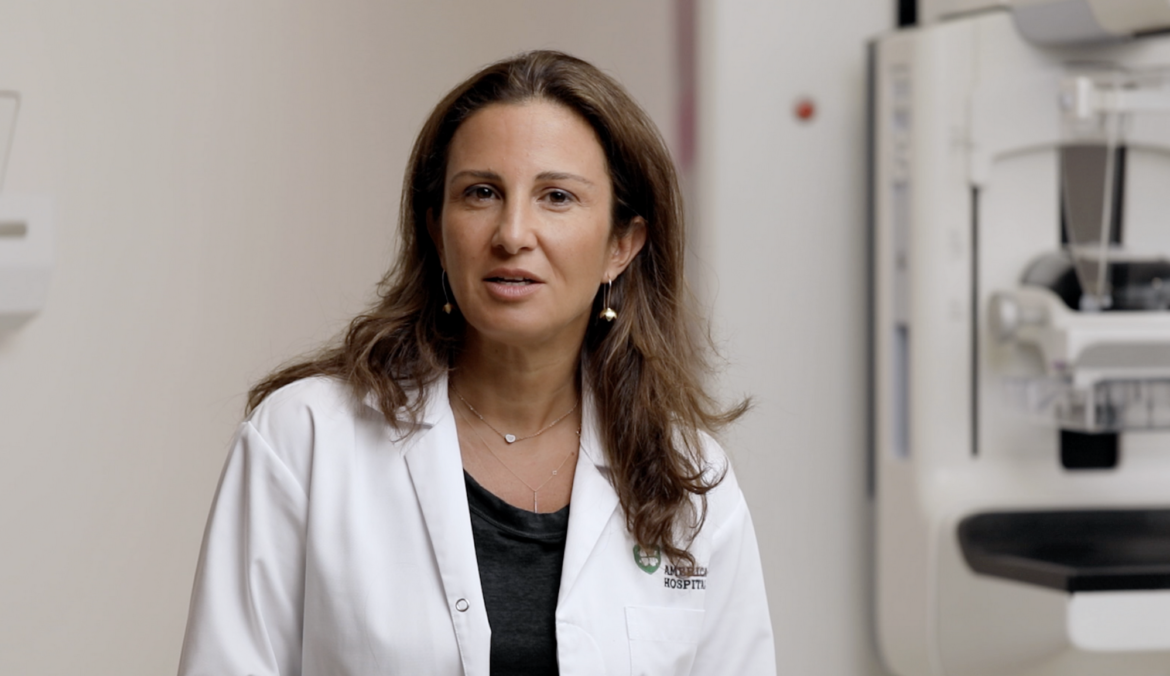For almost two decades now, Dr. Kinda Douaidari has actively advocated for the early detection of breast cancer and her dedication led to a remarkable opportunity – representing the Middle East in the State Department of America’s International Visitor Program for Women in Leadership in the Health Sector.
In a region where healthcare decisions hold great significance, Dr. Kinda firmly believes in empowering women to make informed choices about their own well-being.
Please give us a brief introduction about your personal and professional background
As a wife and mother, my family has always played a pivotal role in my life. The support of my husband and the love and understanding of my son and daughter have been instrumental in my achievements. While maintaining work-life balance can be challenging, dedication and organization have made it a lifestyle.
I am a breast interventional radiologist and serve as the head of the Breast Unit at the American Hospital in Dubai. My professional journey spans over two decades and crosses international borders. It all began in Syria, where I grew up in a family of physicians, nurturing my deep-rooted passion for medicine from an early age. My educational journey commenced in Aleppo, Syria, where I embarked on my medical studies. However, my quest for knowledge led me to Paris, France, where I refined my skills at prestigious universities and renowned hospitals. It was during this time that I chose to specialize in radiology, with a particular focus on women’s imaging, especially breast imaging. My time in Paris was filled with invaluable experiences, but life had different plans for me. The call to return to Syria was compelling, and in Aleppo, I proudly established the first-of-its-kind Women’s Imaging Center. Equipped with state-of-the-art technology, this endeavor marked a pinnacle in my career and brought immense fulfillment.
However, the shadow of war cast a dark cloud over Syria, forcing my family and me to make the difficult decision to leave. We embarked on a new chapter in Dubai, a city that gradually began to feel like a second home. Nevertheless, my heart remains tied to Syria, and I carry a profound sense of empathy for the suffering endured by its people. Throughout my professional journey, my commitment to women’s health, particularly in the field of early breast cancer detection, has remained unwavering.
And this dedication led to a remarkable opportunity – representing the Middle East in the State Department of America’s International Visitor Program for Women in Leadership in the Health Sector. In a region where healthcare decisions hold great significance.
In Syria, I played a pivotal role as one of the founders and the Medical Director of the Canadian Terry Fox Program for Breast Cancer Early Detection in Aleppo. This philanthropic endeavor served as a lifeline for middle- and low-income schoolteachers until the turmoil of war forced it to halt in 2012. Nevertheless, the desire to make a difference persisted, and I contributed to establishing a breast screening center in a disadvantaged neighborhood in Aleppo. In my commitment to giving back, Based in Dubai I have been actively involved in organizing training workshops for breast radiologists.regionally and internationally, These workshops focus on critical areas such as Tomosynthesis, Vacuum Assisted Breast Diagnostic Biopsies, and VABB-assisted excisions. My thirst for knowledge led me to acquire a diploma in AI in healthcare from MIT and a diploma in strategic leadership in healthcare from Harvard.supported by the visionary management of the American Hospital of Dubai
Having studied in France and the United States, how different are their medical systems?
French medicine embraces a holistic approach, emphasizing the interconnectedness of a patient’s physical, emotional, and social well-being. In contrast, American medical practice leans toward a more practical approach, emphasizing cutting-edge technology and evidence-based treatments. These contrasting approaches have always fascinated me and allowed me to appreciate the immense potential for cross-cultural learning. On the other hand, the French health system operates under a government-based insurance system that carefully considers the cost-benefit balance when setting regulations. In contrast, the American health system is independent, relying on evidence-based studies and insurance company reimbursement. For instance, when it comes to breast cancer screening programs, studies have shown that annual mammograms for all women starting at age 40 are the gold standard for early detection and can save lives. Insurance companies in the United States typically cover this, but low-income women may face barriers to access. In France, the government offers mammograms starting at age 50 every two years as part of a free governmental program, While it is available to all women, it’s offered at an older age and less frequently due to these budget constraints.
When it comes to breast ultrasound, the American system typically involves technicians performing the procedure, while the radiologist interprets the results remotely. In France, breast ultrasound is performed by breast radiologists who personally consult with the patient, providing a more patient-centered approach that patients appreciate. Having had the opportunity to work within both systems, I believe that I can offer the best care for my patients by bridging the gap between the French and American systems. This allows me to provide a holistic approach while leveraging advanced technology and evidence-based practices to tailor care to each patient’s unique needs.
And how is work in Dubai like? Describe the awareness level in the UAE
Working in Dubai has been an incredibly enriching experience in my medical journey. The healthcare landscape in Dubai is marked by a commitment to excellence, with world-class facilities and a multicultural environment that fosters collaboration and innovation. The city’s dedication to providing top-notch healthcare services is evident in the state-of-the-art hospitals and clinics that serve both the local and expatriate populations. One notable aspect of working in Dubai is the high level of awareness regarding healthcare, including breast cancer. The United Arab Emirates, including Dubai, has made significant strides in raising awareness about various health issues, with a particular focus on breast cancer. Breast cancer awareness campaigns, events, and screenings are commonplace, encouraging women to prioritize their health and undergo regular check-ups.
In my role as a breast interventional radiologist in Dubai, I have witnessed a strong commitment to advancing women’s health, particularly in the context of breast cancer. The medical community here is dedicated to remaining at the forefront of medical advancements and providing the best possible care to patients. I often convey to my patients that they are fortunate to receive treatment in Dubai. The experience here is distinct from that in Europe, for example, as patients have direct access to cutting-edge technologies in imaging and diagnosis, as well as the latest and most advanced treatment options before they become widely available in many other countries. Overall, working in Dubai offers a dynamic and supportive environment where healthcare professionals like myself can contribute to the well-being of a diverse and growing population. It is a healthcare system that places a high value on awareness, accessibility, and excellence.
How can women prevent breast cancer?
While we can’t completely prevent breast cancer, early detection is crucial for the best outcomes with minimal treatment and surgery. However, there are several lifestyle choices and risk reduction strategies that women can adopt to potentially lower their risk of developing the disease:
Maintain a Healthy Lifestyle: Diet: Focus on a balanced diet rich in fruits, vegetables, whole grains, lean proteins, and healthy fats. Limit the consumption of processed foods, sugary beverages, and high-fat foods. Physical Activity: Engage in regular physical activity. Aim for at least 150 minutes of moderate-intensity exercise per week. Alcohol Consumption: Limit alcohol intake. Studies suggest that even moderate alcohol consumption may increase breast cancer risk. Maintain a Healthy Body Weight: Obesity is associated with an increased risk of breast cancer, particularly after menopause. Maintaining a healthy weight through diet and exercise can help lower this risk.
Breastfeeding: If possible, consider breastfeeding. Women who breastfeed may have a slightly reduced risk of developing breast cancer.
Hormone Replacement Therapy (HRT): If considering hormone replacement therapy for menopausal symptoms, discuss the potential risks and benefits with a healthcare provider.
Regular Screening: Adhere to recommended breast cancer screening guidelines. Mammograms and clinical breast exams can help detect breast cancer at an early, more treatable stage.
Know Your Family History: Be aware of your family history of breast cancer. If you have close relatives with a history of the disease, consult with a healthcare provider about your risk and any additional screening or preventive measures.
Genetic Testing: For individuals with a strong family history of breast cancer or specific genetic mutations (e.g., BRCA1 or BRCA2), genetic counseling and testing may be advisable. These tests can help assess your risk and guide preventive strategies.
Limit Exposure to Environmental Toxins: While the evidence is not definitive, some studies suggest a potential link between certain environmental toxins and an increased risk of breast cancer. Reducing exposure to harmful chemicals and pollutants in the environment is a prudent step.
It’s important to note that breast cancer can still occur in individuals who follow a healthy lifestyle and have no known risk factors. Regular breast self-exams and screenings remain critical for early detection. Women should consult with their healthcare providers to create a personalized risk assessment and discuss appropriate preventive measures based on their individual circumstances.
And what is a common misconception about breast cancer?
The most common misconception is that a biopsy can lead to the spread of cancer. This is a completely incorrect idea and may result from unprofessional practices. Another misconception is the belief that without a family history, breast cancer is unexpected. In reality, only about 20% of breast cancers are hereditary. A third important misconception is the concern that the X-ray dose used in mammograms can cause breast cancer. This is entirely untrue. To put it in perspective, a study in the US found that the amount of radiation exposure during a round trip between LA and New York is equivalent to the radiation from a mammogram.
If you had one piece of advice for all our readers, what would it be?
Prioritize your well-being: Your health is paramount. Engage in regular self-care, including breast self-exams and health check-ups. Advocate for your health, seek medical advice or screenings when necessary, and remember that early detection can save lives.
Text by Victor Gee




